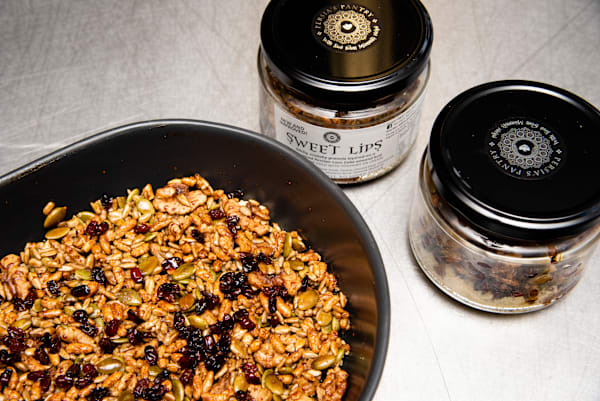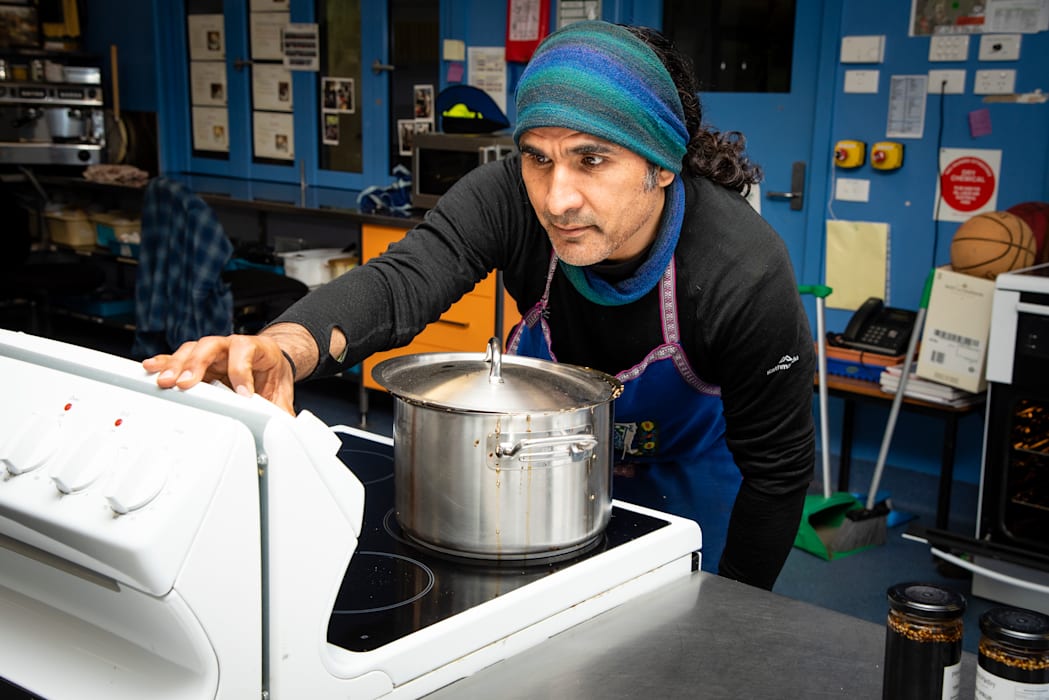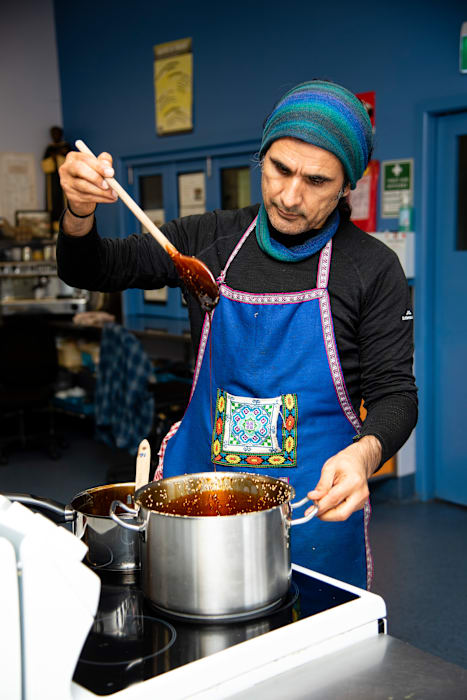writer and photographer PEN TAYLER
Arad Niksefat is at a festival in Woodbridge where he is selling his own produce. I buy some Tira Syrup from him, and in the process we get talking. Tira Syrup is a date syrup. He tells me that he sources the dates from his mother who lives in Iran where she has a small farm. The syrup is delicious and very versatile, as I discover when I take it home: it’s an excellent addition to a bowl of muesli, fruit and yoghurt, or you can use it to add some extra flavour to your desserts. It’s sweet without being too sweet.
Niksefat is a refugee from the south-western Iran province of Khuzestan, near the border with Iraq. In 1980, his family was forced by the authorities to move from their lands as a result of the Iran-Iraq war. While his extended family walked for a few weeks, carrying nothing except a small bag of their belongings, until they reached the city of Shiraz, his father stayed to protect and fight for the land with the army. In the process the family became homeless. Unfortunately for Arad, it wasn’t to be the first time in his life he would be homeless.
. . .
Tira Syrup isn’t the only product Niksefat makes. For his business, Persia’s Pantry, he currently makes four products: Sweet Lips, Persian Brekkie, Persian Love Dates and Tira Syrup, which can all be described as “traditional Persian food using his mother’s recipes with an Aussie twist”. Other than the dates, he sources all his ingredients from Tasmanian organic and natural food provider, Eumarrah.
His mother, Tajalei, began making these same products many years ago in order to help the family survive in Shiraz. When Niksefat was about five, she took him around the bazaars to help her sell the products. It was a hard childhood; the family were often hungry and cold.
By the time he was seven or eight, young Arad was taking the products to the bazaars himself. One day he protested to his mother that he didn’t like doing it. “She said to me, ‘One day these experiences, this skill, will help you somewhere.’ And when I came here [to Australia] I didn’t have a skill I could use. I’m a pathologist but the government doesn’t let me work as one. I called my mum and told her, ‘Now I understand what you said to me’.”
He talks to his mother regularly via Skype, sometimes getting tips from her for his cooking.
. . .
The minority group Ahwazi Arabic, of which Arad Niksefat’s family are members, are “not exactly Persian (Iranian) people and not Arabic people”. The place they came from was “a small village full of water, reeds and small islands in the south of Iran. We are Iranian but accept culture from Iraq and Jordan.”
In 2012 he was once again forced to flee his home. This time though he had to leave his country as well, after being imprisoned and persecuted for writing about and advocating for the Ahwazi Arabic people. After spending time in a number of Australia’s Detention Centres, he was granted refugee status and moved to Perth, WA.
He moved to Tasmania in 2020, in part because part of his visa requirement is to live in a regional area, which Tasmania is considered. It was difficult at first because he arrived during lockdown, knew no-one and was homeless with no job. He said, “I hated going to Centrelink. I slept in my car. But then in Cygnet I found my place. Cygnet supports me.”
The other reason he chose Tasmania is because he thought it would remind him of his village, his country. “Tasmania is surrounded by three things: water, light and blessing. My country is a lot of land surrounded by water with islands, islands, islands. When I came here it reminded me of my home, the light, all that deep sky and the water. The beautiful light. It’s a place full of everything with very nice people. We need the water. It’s part of how our traditional people live.”

Persia’s Pantry began in Perth, when he met some Australians who invited him to a barbecue. They turned out to be very helpful. “I started with $200 of my own money and they [his Australian friends] bought a gazebo for me and a table for me. They gave me a lot of stuff. They talked with the church and asked if I could cook there and sorted out the legislation for the business including registering the business name. It was fantastic. We supplied IGAs, cafes etc and it’s still going in Perth with Australians running it. So I support some Australian people. I created work for citizens!”
Niksefat enjoys cooking. When he’s cooking he remembers his mother cooking and how much she enjoyed it as well – how it was a time for her to connect with herself.
He also continues to write. He began writing when he was still at school when “the art teacher read a story to us and I fell in love with his storytelling style”. Today he writes about the situation of asylum seekers and refugees, and of the experience he has gained during this period of his life. He leaves me with these words: “When you see someone like me, who is very strange to you, approach him without judgement and listen to his story. Please respect him and share your smile with him.”
To contact Arad Niksefat, or find out more information about Persia’s Pantry products, visit www.persiaspantry.com.au.
Pen Tayler is a Tasmanian writer and photographer. She photographed 12 towns for Towns of Tasmania, written by Bert Spinks, and has written and provided images for Hop Kilns of Tasmania (both Forty South Publishing). She has also written a book about Prospect House and Belmont House in the Coal River Valley.












